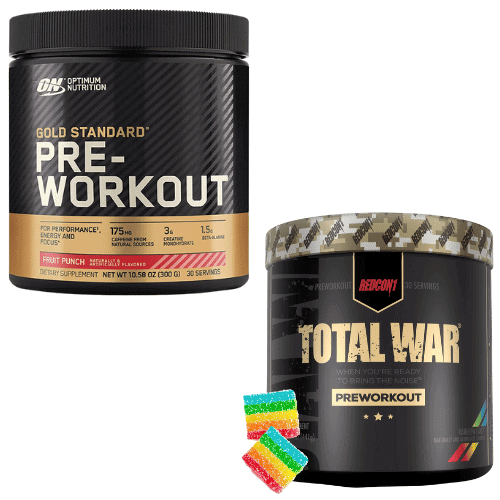Beverages like pre-workout supplements or coffee provide that extra energy boost to help you maximize your workouts and achieve greater performance and results. But which beverage is more effective in fueling your workout?
This article will compare pre-workout vs coffee to determine which has the upper hand in providing energy. We’ve also provided some tips and guidelines below to help you pick what suits you better.
Pre-Workout vs Coffee
Coffee provides a natural, modest energy boost and improved focus, with fewer potential side effects.
Who should use pre-workout instead of coffee?
⢠Pre-workout is best for competitive athletes and fitness enthusiasts seeking comprehensive performance benefits and support from specialized ingredients.
Who should use coffee instead of pre-workout?
⢠Coffee is ideal for casual exercisers or those sensitive to stimulants, seeking a natural, convenient, and gentler energy boost.
Understanding Pre-Workout Supplements

Pre-workout supplements are generally used to help boost physical and mental performance during workouts build muscle, repair tissue, and even aid in weight loss. Some supplements also provide important nutrients and vitamins to function well that you might not always get from eating alone.
One study published in the Frontiers in Nutrition Journal discovered that taking pre-workout supplements can efficiently supply nutrient needs, not only for athletes, bodybuilders, and fitness enthusiasts, but also for older adults, vegetarians, and vegans who tend to lack protein given their age and for their diets.
Common Ingredients Found In Pre-Workout Supplements
Here are some of the more common ingredients included in pre-workout supplements, each with its own benefits:
- Beta-alanine – A complex compound that helps you train harder by delaying muscle fatigue by reducing the amount of lactic acid in the muscles, allowing you to work out with high intensity.
- Branched-chain amino acids (BCAAs) – These proteins are found naturally in protein-rich food, like meat and dairy. They have many benefits such as decreasing muscle soreness, reducing exhaustion from exercise, stimulating muscle growth, and benefitting liver health.
- B-complex vitamins – The B-complex vitamins, particularly B6, B12, and folate, help the body to produce energy, delay fatigue, maintain muscular endurance, and promote a healthy nervous system.
- Caffeine – Caffeine, as we know, increases alertness, energy, and focus. It helps improve both power and endurance in the muscles, increases blood flow, and lowers the perception of effort.
- Electrolytes – Electrolytes are substances that have a natural positive or negative electrical charge when dissolved in water and facilitate basic bodily functions. The principal electrolytes include sodium, potassium, chloride, magnesium, calcium, and phosphate.
- L-citrulline – An amino acid found in the body which produces a chemical known as nitric oxide, which helps your blood vessels to expand, which then allows for easier blood flow during workouts, making it easier for oxygen and other nutrients to get to the muscles.
- L-glutamine – Like beta-alanine, L-glutamine can also help reduce post-workout muscle soreness and promote faster recovery.
- Taurine – Taurine helps reduce muscle fatigue and allows for higher-intensity workouts. It can also increase force generation in muscles to maintain the strength of muscular contractions.
- Tyrosine – Tyrosine has been shown to increase levels of the neurotransmitters dopamine, adrenaline, and norepinephrine, which provide increased energy and endurance.
Protein
Proteins are considered the building blocks of life since every cell in the body contains them. They play many critical roles in the body, do most of the work in cells, and are required to structure, function, and regulate the body’s tissues and organs.
Most people drink protein shakes for muscle gain, weight loss, and injury recovery. It also promotes bone development, tissue repair, and hormone regulation.
Creatine
Creatine is an amino acid derivative that helps improve strength, increase lean muscle mass, and promote muscle recovery after a workout. It also provides a continuous energy supply by keeping production up in working muscles (stored in the skeletal muscle) and is used during physical activities.
Cons Of Pre-Workout Supplements
Overstimulation
Most pre-workout supplements, with their high caffeine content, along with other ingredients, stimulate the central nervous system. However, the energy could exceed the limit the central nervous system can accommodate and result in a tingly, jittery sensation, along with other problems like sleeplessness, increased heart rate, and anxiety.
Taking pre-workout supplements may also cause some occasional side effects such as:
- Headaches
- Water retention
- Stomach problems
- Dehydration
- Increased risk of muscle cramps
The Power of Coffee

Many start their day with a warm cup of joe. Its principal benefits, like increased mental focus, boosted energy, and weight loss properties, help people get through the day’s workload, so it’s no surprise that many people also drink coffee as a pre-workout drink to improve their performance.
Coffee, an ergogenic aid (performance booster), in itself is a natural source of caffeine and antioxidants and is low in calories. Drinking coffee before a workout can assure:
- Boosted strength and performance
- Increased aerobic power
- Enhanced focus and alertness
- Reduced anaerobic exhaustion
- Reduced muscle pain
Cons Of Coffee As A Pre-Workout
While coffee seems promising as a pre-workout drink, some people may not always experience its benefits at their purest. Some people tend to experience the following side effects as a result:
- Headaches
- Jitters
- Rapid heartbeats
- Energy crashes
- Dehydration
- Acid reflux
Optimizing Coffee Consumption For Workouts
To help maximize your pre-workout coffee’s benefits, follow these tips on how to drink your cup of joe before any physical activity:
Timing
Nutritionists recommend drinking coffee around 45 minutes to an hour before a workout/game to allow the bloodstream to fully absorb the caffeine and reach its peak.
Dosage
The FDA recommends a maximum of 400 milligrams of coffee daily, which is about four or five cups.
Type Of Coffee
Any type of regular, brewed coffee can yield the same benefits, as long as it’s not heavily sugared or flavored since such coffees are harder to digest and are high in calories.
Comparing Pre-Workout Supplements and Coffee
Which of these two pre-workout fixes is better than the other? We’ll compare the two based on their similarities and differences.
Similarities
- Provides strength and energy – Both pre-workout supplements and coffee give a sufficient energy boost to fuel your workout exercises and other physical activities and remove the notion of exhaustion. They also give sharper focus and heightened alertness.
- Caffeine content – Both coffee and (some) pre-workout supplements contain caffeine. The caffeine content, however, in pre-workout varies depending on the brand or the chosen variant, ranging between 150 – 300 mg of caffeine per serving.
Differences
- Additional ingredients – Pre-workout supplements contain more ingredients than regular coffee since the latter is just made of regular coffee beans, though powdered coffee products could have additional ingredients.
- Natural vs artificial sources/ingredients – Regular, brewed coffee is made of coffee beans. Pre-workouts, having more ingredients, may differ on where they source their ingredients, whether they opt for more natural or the standard artificial sources.
- Nutritional profile – While both coffee and pre-workouts provide energy, pre-workout, unlike coffee, contains beneficial amino acids and muscle-building vitamins and minerals. The same amino acids help increase blood flow and delay muscle fatigue.
Tailoring Your Choice To Your Workout Needs
When choosing between pre-workout supplements or coffee, you need to consider your health needs and fitness goals first.
Choosing The Ideal Option (Based On Workout Goals)
- Caffeine sensitivity – If you’re caffeine-sensitive, you might need to steer clear of caffeine and look for a caffeine-free option.
- Endurance training – One study showed that pre-workout supplements help delay fatigue while improving reaction time and muscular endurance.
- Weightlifting – While both coffee and pre-workouts promote energy and focus, pre-workouts facilitate muscle protein synthesis, so if you’re aiming to lift more or build more muscle, a pre-workout supplement would suit you better.
- High-intensity interval training (HIIT) – Both pre-workout supplements and coffee can promote endurance during HIIT and help with weight management and the acceleration of body fat mass loss.
Expert Opinions & Recommendations
In terms of energy, Nutritioneering founder and professional bodybuilder Jeremy Fox believes it’s easier to increase or decrease the amount of caffeine in coffee based on the type and amount of beans or grounds used, compared to pre-workouts, and that it’s much more cost-efficient.
However, he concedes that pre-workout supplements are ultimately superior to coffee for promoting weight loss, greater gains, and improving overall performance in the gym, given that it has a wider nutritional profile – an opinion shared and emphasized by Total Shape senior fitness trainer Connor Sellers and Garage Gym Pro co-founder Andrew White.
How To Optimize Workout Performances
Whether you opt for a pre-workout supplement or coffee, the success of your workout performance won’t depend on your choice of a pre-workout fix, but it would ultimately depend on your effort and commitment to your fitness goals.
Your choice of a pre-workout must go with the following:
- Proper nutrition – Proper nutrition is crucial to maximizing physical performance. Without enough carbohydrates, proteins, and fats, you may feel sluggish and not get all the important nutrients and minerals needed to build goals. The American College of Sports Medicine recommends eating a healthy meal before, during, and after workouts to maximize exercise performance and improve recovery time.
- Hydration – Drinking enough water is essential since it transports the nutrients needed for producing protein and glycogen structures, the building blocks of muscles. It also helps maintain concentration and alertness, increase endurance, and prevent spikes in heart rate and body temperature.
- Sufficient rest – Always take your rest days seriously. When resting, the muscles start to heal and become stronger, to help you work out with more ease in the future. Experts recommend 24 to 48 hours of recovery between sessions for the same muscle group to prevent overtraining and get better results.
Recap
- Coffee and pre-workout supplements are popular among athletes, fitness professionals, and people with active lifestyles since they provide extra energy to help them perform better and maximize their workout routines.
- While both provide energy, pre-workout supplements have the edge, since they contain amino acids, vitamins, and minerals that promote muscle development and improve physical performance overall.
- Proper nutrition, hydration, and rest, paired with a pre-workout fix of your choice, helps you gain your fitness goals more effectively.
Conclusion
Pre-workout supplements and coffee provide much-needed energy boosts, especially for people with active lifestyles like athletes and fitness enthusiasts. Though pre-workout supplements generally have more to offer, try to experiment with either fix to see which will suit your needs and goals better.
Pre-workout fixes, however, should always be supplementary to proper nutrition and an active, healthy lifestyle, which are vital in attaining your fitness goals.
Disclaimer: this article does not constitute or replace medical advice. If you have an emergency or a serious medical question, please contact a medical professional or call 911 immediately. To see our full medical disclaimer, visit our Terms of Use page.










